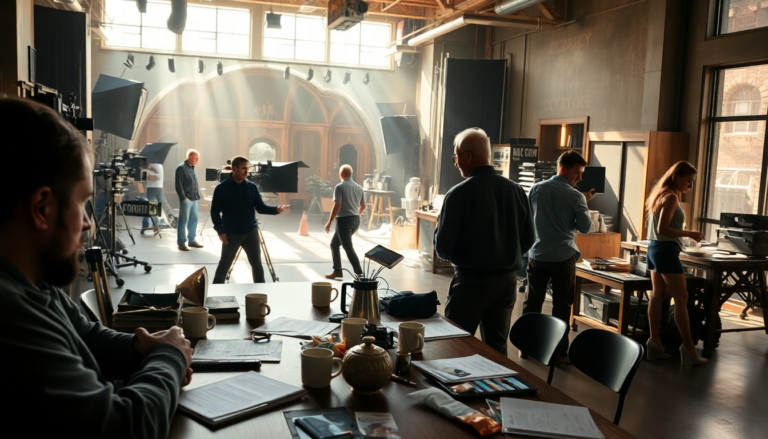Argomenti trattati
When you think about Hollywood, what comes to mind? Glitz, glamour, and endless drama, right? But have you ever wondered what really happens behind the scenes? Two shows currently captivating audiences are Hacks and The Studio, both of which offer a humorous yet piercing look at the chaotic inner workings of the entertainment industry. It’s this blend of authenticity and absurdity that keeps viewers hooked, making us both laugh and reflect on the realities of showbiz.
A clash of realities: Hacks and The Studio
Hacks, which recently snagged an Emmy for Outstanding Comedy Series, follows the journey of Jean Smart’s character, Deborah Vance, a seasoned stand-up comic navigating the turbulent waters of a late-night television show. In season 4, she makes history as the first female host of a major late-night program. This season marks a significant shift from previous episodes, taking place in Los Angeles rather than Las Vegas, a change that reflects Deborah’s career trajectory. The show dives deep into the daily grind of a TV network, showcasing the creative tensions between Deborah and her head writer, Ava, as they grapple with both artistic integrity and corporate demands.
On the other hand, The Studio, co-created by Seth Rogen, presents a more satirical anthology of life within a fictional movie studio. Its protagonist, Matt Remick, finds himself unexpectedly promoted to head of Continental Studios, bringing to life absurd yet relatable struggles that come with the job. Inspired by Rogen’s own experiences in Hollywood, the show cleverly satirizes the industry’s quirks while still resonating with a sense of authenticity. The interplay between chaos and creativity in both series sheds light on the age-old tension between art and commerce in the entertainment world.
Character arcs and guest appearances
Character development is a key element in both Hacks and The Studio. While Deborah Vance’s evolution into a late-night powerhouse reflects the changing dynamics of the industry, Matt Remick’s naive yet earnest approach to studio management reveals the often ridiculous nature of Hollywood power plays. The guest appearances in both shows are noteworthy, with A-list stars adding a layer of authenticity. It’s like a star-studded game of peekaboo where the audience gets to see their favorite actors stepping into the shoes of exaggerated versions of themselves, adding to the comedic flair.
Interestingly, Hacks features cameos from legends like Carol Burnett and Rosie O’Donnell, while The Studio showcases Martin Scorsese in a role that blurs the lines between reality and fiction. These appearances not only bolster the credibility of the shows but also serve as a testament to the intertwining of real-life experiences and scripted narratives. I remember when I first saw Scorsese’s cameo; it felt like a nod to the industry’s rich history, making the satire even more profound.
The absurdity of Hollywood
One of the most compelling aspects of The Studio is its commitment to portraying the absurdity of Hollywood decisions. Rogen shared a personal anecdote about a film that won a Golden Globe but left an executive in tears because they weren’t mentioned in the acceptance speech. This kind of behind-the-scenes drama is what makes the show resonate; it’s both comical and cringeworthy, reflecting the often surreal nature of fame and recognition in the industry.
On the flip side, Hacks offers a more grounded yet equally chaotic portrayal of showbiz life. The pressures faced by Deborah and Ava are palpable, especially with the looming presence of network executives like Helen Hunt’s character, Winnie. The constant push for excellence, coupled with frequent interventions from HR, paints a vivid picture of the challenges that creators face in a high-stakes environment. It’s a reminder that, behind the laughter and applause, there’s a relentless grind that demands resilience and creativity.
Contrasting tones and themes
What sets Hacks and The Studio apart is their distinct tones. Hacks embraces a contemporary outlook, with Ava’s character challenging the status quo and pushing for a more progressive narrative. In contrast, The Studio leans into nostalgia, paying homage to classic Hollywood while showcasing the outdated practices that can still govern the industry today. It’s like watching a gripping drama unfold between past and present, where each show represents a different facet of the entertainment landscape.
But, just like in any good Hollywood story, chaos reigns supreme in both series. The stakes are high, and the characters are often caught in a whirlwind of conflicting interests. The “art vs. commerce” debate is a thrilling undercurrent, as both shows explore how those in power navigate the balance between creative vision and financial viability. It’s a dance as old as time, with every step reflecting the tensions that define show business.
In the end, it’s all about the love for entertainment
Both Hacks and The Studio capture the essence of a Hollywood that’s been through the wringer yet still holds a torch for the art of storytelling. They remind us that even amidst the chaos, the passion for entertainment remains unshaken. Personally, I believe that’s what makes these shows so compelling—there’s a shared love for the craft that transcends the absurdity. It’s this blend of humor, heart, and authenticity that resonates with audiences, making us both laugh and ponder the complexities of the entertainment world.

